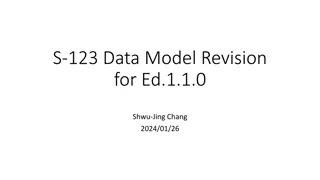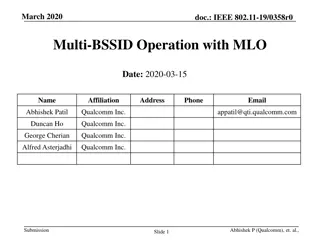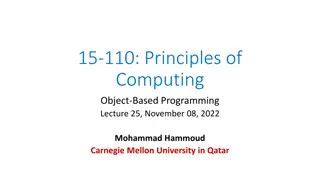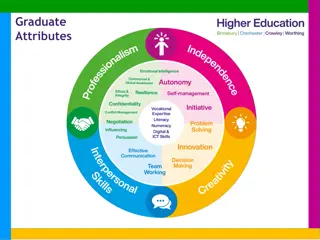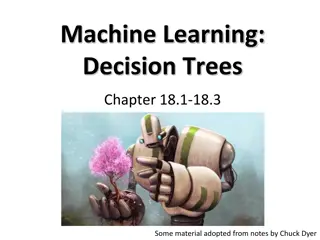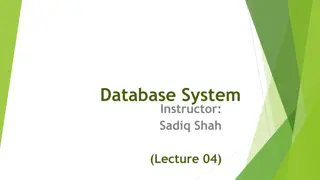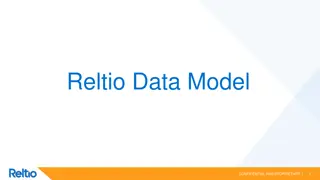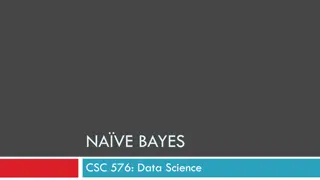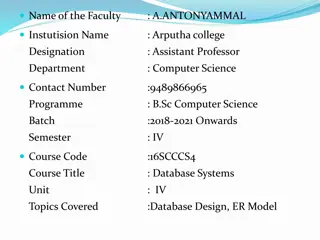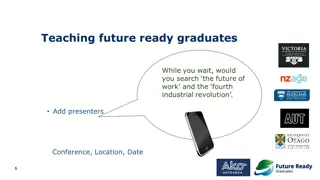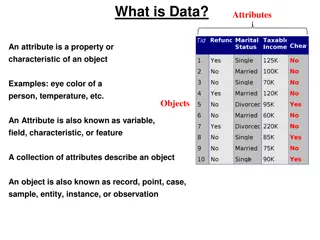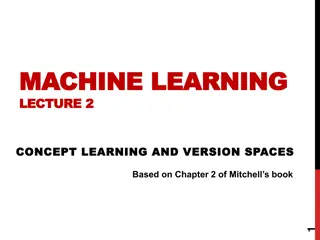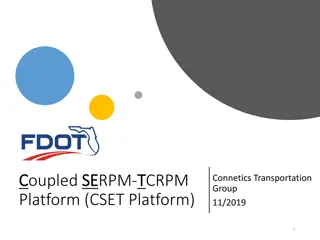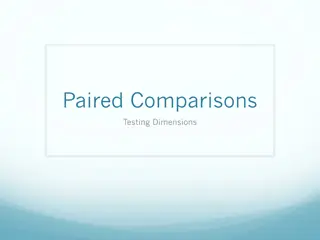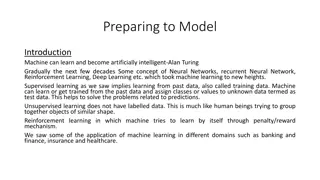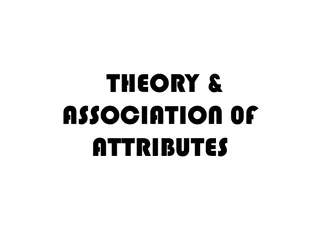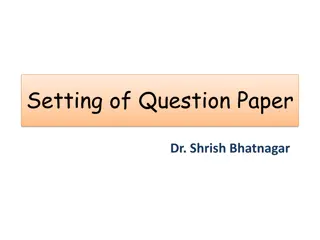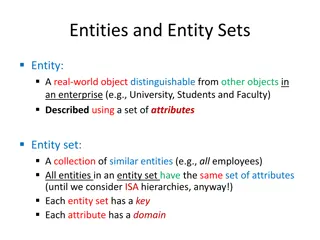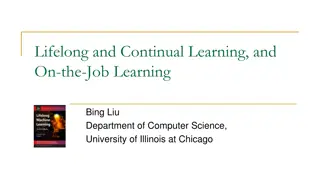Update Summary of S-123 Data Model Revision and Major Changes
This document outlines the revisions and major changes in the S-123 Data Model, including the addition and remodeling of feature types, information types, and data models to support remote control and connectivity. It also details the removal and addition of attributes and the restructuring of compl
5 views • 23 slides
Understanding Design Tactics and Quality Attributes
Quality attributes play a crucial role in system design by indicating how well a system meets stakeholder needs. Architecturally Significant Requirements (ASRs) have a profound impact on system architecture. Quality attributes can be operational (availability, reliability) or developmental (modifiab
2 views • 28 slides
Attributes of Outstanding Trusted Advisors: Ethical Resilience and Results Focus
Explore the key attributes of exceptional trusted advisors, focusing on ethical resilience and results orientation. Learn about qualities such as integrity, courage, accountability, and a results-driven approach essential for building trust and delivering valuable insights as a trusted advisor in va
1 views • 47 slides
Multi-BSSID Operation with MLO Overview and Signaling Considerations
The document discusses the integration of Multiple BSSID set feature and Multi-Link Operation (MLO) in IEEE 802.11 networks. It delves into the setup of virtual Access Points (APs) on the same device with distinct attributes, the formation of common parameters across APs within an MLD, and the signa
1 views • 13 slides
Understanding Sensory Attributes of Ice Cream and Frozen Desserts in Dairy Technology
Ice cream and frozen desserts are formulated with dairy products, sugars, flavorings, and stabilizers. Various types are available, each with unique characteristics like flavor, body, texture, and melting quality. High-quality ice cream should possess a balanced flavor, desirable body, and smooth me
0 views • 13 slides
Object-Based Programming in Python: Exploring Classes and Constructors
Understanding object-based programming in Python involves creating classes with attributes and methods to build objects. By utilizing class constructors, you can initialize objects with specific values, allowing for unique instances with distinct characteristics. This tutorial covers the fundamental
2 views • 16 slides
Exploring Skills and Attributes for Personal Inquiry Planning
Discover the skills and learner profile attributes you currently utilize in your personal inquiry process, and reflect on areas for improvement to enhance your planning effectiveness. Engage with insightful image slides depicting key aspects of inquiry planning and self-assessment.
1 views • 9 slides
Understanding Entity-Relationship Model in Database Systems
This article explores the Entity-Relationship (ER) model in database systems, covering topics like database design, ER model components, entities, attributes, key attributes, composite attributes, and multivalued attributes. The ER model provides a high-level data model to define data elements and r
0 views • 25 slides
Attributes of Successful Sports Leadership
Successful sports leadership involves key attributes such as effective communication, organization of equipment, and in-depth knowledge of the sport. Leaders must communicate clearly with their team, organize sessions efficiently, and possess knowledge of tactics, training, and rules. Additionally,
0 views • 8 slides
Understanding Graduate Attributes and Essay Writing Structures
Explore the concepts of graduate attributes, essay writing structures, and SOLO taxonomy in education. Understand the levels of understanding using SOLO Taxonomy and learn about the PESEL methodology for effective essay writing. Discover ways to introduce academic essays and the importance of defini
0 views • 30 slides
Understanding Decision Trees in Machine Learning
Decision trees are a popular supervised learning method used for classification and regression tasks. They involve learning a model from training data to predict a value based on other attributes. Decision trees provide a simple and interpretable model that can be visualized and applied effectively.
1 views • 38 slides
Understanding Modeling Entities and Attributes in Database Systems
Entities, relationships, and attributes are fundamental constructs in the Entity-Relationship (E-R) model. Entities represent people, places, objects, events, or concepts in a user environment. Each entity type has a set of attributes defining its properties. It is crucial to distinguish between ent
2 views • 17 slides
Pear Cut Performance Study: Attributes, Grades, and Price Index Formula
This content delves into a comprehensive study of pear cut diamonds, focusing on attributes like Positive/Negative Rarity, Vulnerability to Chipping, Fluorescence Index, and more. It includes analysis of specific pear diamonds such as AJ-13.9_0.53.ct_H_VS1 and BQ6-165.1_0.52.ct_H_IF, along with insi
0 views • 8 slides
Special Slaves of Rahman - Attributes of Excellence in Islamic Practices
Special Slaves of Rahman strive for excellence in various aspects of faith and practice. They focus on voluntary submission, outer appearance, benevolent behavior, optimizing nights, ethical earnings, monotheism, avoiding sins like murder, and upholding moral values. These attributes emphasize the i
1 views • 18 slides
Understanding Reltio Data Model and Architecture
Reltio offers a dynamic and metadata-driven data model that simplifies database modeling and allows for easy changes without impacting the underlying storage. Key differences between Reltio and relational models include multi-valued attributes, nested attributes, and built-in address cleanse engine.
3 views • 18 slides
Understanding Naive Bayes Classifier in Data Science
Naive Bayes classifier is a probabilistic framework used in data science for classification problems. It leverages Bayes' Theorem to model probabilistic relationships between attributes and class variables. The classifier is particularly useful in scenarios where the relationship between attributes
1 views • 28 slides
Understanding Entity-Relationship Modeling in Database Systems
Entity-Relationship (ER) modeling is a crucial aspect of designing database systems. It helps in defining data elements and relationships, presenting a conceptual view of the database structure. Entities, attributes, key attributes, composite attributes, and multivalued attributes play distinct role
1 views • 33 slides
Developing Essential Skills and Attributes for Success
Essential skills encompass basic, vocational, and transferable skills necessary for everyday life and any job. Attributes like confidence, tolerance, independence, and resilience are equally vital. Employers value skills such as problem-solving, goal-setting, teamwork, and communication. Developing
1 views • 11 slides
Empowering Future Graduates: Transformative Teaching for Career Success
Explore the essential capabilities and attributes future graduates need for successful careers through a pedagogical framework. The conference features engaging sessions on shift in teaching emphasis, graduate attributes, and the 4 Es Framework. Join us to reflect, collaborate, and strategize for em
1 views • 27 slides
Understanding Data Attributes and Types for Analysis
Exploring the concept of data attributes, this information covers attributes as properties of objects, the distinction between experimental and observational data, types of attributes like qualitative and quantitative, and the properties of attribute values. It also delves into examples and categori
2 views • 32 slides
Innovative Learning Management System - LAMS at Belgrade Metropolitan University
Belgrade Metropolitan University (BMU) utilizes the Learning Activity Management System (LAMS) to enhance the learning process by integrating learning objects with various activities. This system allows for complex learning processes, mixing learning objects with LAMS activities effectively. The pro
4 views • 16 slides
Understanding HTML Image Tags and Attributes
Delve into the world of HTML image tags and attributes with this detailed overview. Learn how to display images, make them clickable links, adjust image sizes, and utilize various attributes for styling and alignment. Discover the differences between image formats such as GIF and JPEG, and master th
1 views • 32 slides
Understanding Concept Learning and Version Spaces in Machine Learning
In the field of machine learning, concept learning involves inferring general definitions of concepts from labeled examples. This process aims to approximate the best concept description from a set of possible hypotheses. The concept learning approach is illustrated through examples, such as predict
0 views • 18 slides
Transportation Network Modeling and Analysis with C.Coupled SE Platform
This content outlines the features and functionalities of the C.Coupled SE Platform (CSET Platform) developed by the Connetics Transportation Group. It covers aspects such as interface design, inputs merging, purposes, platform development using Cube, TAZs merging, and network attributes. The platfo
0 views • 11 slides
Understanding Object-Oriented Programming (OOP) in Python
Object-Oriented Programming (OOP) is a programming paradigm that focuses on organizing code into objects with attributes and behaviors. Python supports various OOP concepts such as classes, objects, inheritance, polymorphism, abstraction, and encapsulation. Classes serve as blueprints for creating o
0 views • 29 slides
Exploring Shapes and Attributes in 3rd Grade Mathematics
Delve into reasoning with shapes and their attributes for 3rd-grade students using engaging tools and activities. This educational material covers composing and decomposing triangles and quadrilaterals, identifying and drawing various types of quadrilaterals, and fostering critical thinking skills t
0 views • 24 slides
Event Coreference Resolution Task and Features Analysis
Event Coreference Resolution Task involves analyzing various events, such as explosions and bombings, to determine connections and resolve references. Features include event type, triggers, similarities, distances between events, argument overlaps, and more. Incorporating event attributes as feature
0 views • 31 slides
Modelling and Optimization of Quality Attributes in Software Variability
Modelling and multi-objective optimization of quality attributes in variability-rich software is crucial for customizing software functionality to meet stakeholders' diverse needs. This involves addressing conflicting quality requirements such as cost, reliability, performance, and binary footprint
0 views • 34 slides
Exploring Paired Comparisons Testing Dimensions in Cultural Domains
Studying attributes in cultural domains involves various methods like free listing, pile sorts, and triad tests. Rating scales and paired comparisons are used to evaluate items based on attributes. Paired comparisons produce rank-ordered lists and can be done effectively with tools like Anthopac, en
0 views • 11 slides
Understanding Property Fitting Analysis Using PROFIT Method
Property Fitting Analysis, with the use of the PROFIT method, evaluates the correlation between item attributes and their locations in a multidimensional space. It helps test theories on how people perceive similarities among items in a cultural domain by analyzing MDS graphics, clusters, and dimens
0 views • 29 slides
Understanding Machine Learning: A Comprehensive Overview
Machine learning has evolved significantly over the decades, driven by concepts like Neural Networks, Reinforcement Learning, and Deep Learning. This technology enables machines to learn from past data to make predictions. Activities in machine learning involve data exploration, preparation, model t
0 views • 16 slides
Update of Medium- and Heavy-Duty Vehicle Attributes for Energy Commission Transportation Forecasting
This project aims to support the Energy Commission's transportation energy demand forecasting efforts by updating historic and forecast attributes of medium- and heavy-duty vehicles. Tasks include administration, review of past forecast attributes, updating historical vehicle attributes, forecasting
0 views • 12 slides
Medium and Heavy-Duty Vehicle Attributes for Energy Commission Forecasting
This project aims to update historic and forecast attributes of medium and heavy-duty vehicles to support Energy Commission transportation energy demand forecasting efforts. Tasks include reviewing forecast attributes, updating vehicle technology forecasts, and forecasting ZEV and low-NOx fueling/ch
0 views • 20 slides
Mapping Project Overview and Attributes
This content provides detailed information about a mapping project involving the transition from S.S-53 to S-124, including complex and simple attributes, spatial references, and metadata. It covers aspects such as domain models, NAVWARN preamble, complex vs. simple attributes, and more. The content
0 views • 23 slides
Importing and Loading ASSIST Data into Banner - CISOA/3CBG Conference 2014
Overview of the process involved in importing XML transcripts and loading ASSIST data into Banner for the CISOA/3CBG Conference 2014. The presentation covers two technologies used, Banner setup, XML XSL translation, data source details from eTranscriptCA (California Transcript Exchange), loading ASS
0 views • 25 slides
Attributes of Good and Expert Auditors Exploration
This session explores the attributes that distinguish GOOD and EXPERT auditors, allowing participants to rank their importance. A comparison with a U.S. study will be conducted, and a catchphrase identifying essential auditor traits will be developed. Attributes such as creativity, judgment, knowled
0 views • 14 slides
Understanding Theory and Association of Attributes
Attributes are studied under Theory of Attributes and Association of Attributes. Theory of Attributes covers basic concepts like statistics of variables, while Statistics of Attributes deals with qualitative data that can't be measured quantitatively. Conditions and classifications with reference to
0 views • 27 slides
Attributes of Good Question Design in Test Papers
The presentation discusses the essential attributes of designing good test questions, focusing on clarity, reliability, validity, authenticity, and fairness. It emphasizes the importance of clear instructions, precise terminology, and unbiased evaluation criteria in creating effective assessment too
0 views • 31 slides
Understanding Entities and Relationships in Database Design
Explore the concepts of entities, entity sets, attributes, key attributes, single-valued and multi-valued attributes, derived attributes, as well as relationships and relationship sets in the context of database design. Gain insights into distinguishing between regular entities, weak entities, and e
0 views • 24 slides
Lifelong and Continual Learning in Machine Learning
Classic machine learning has limitations such as isolated single-task learning and closed-world assumptions. Lifelong machine learning aims to overcome these limitations by enabling models to continuously learn and adapt to new data. This is crucial for dynamic environments like chatbots and self-dr
0 views • 32 slides
